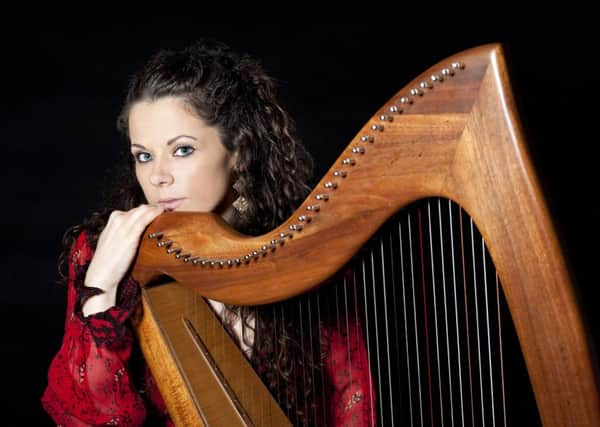Previewing Edinburgh International Harp Festival


To which do you ascribe most prominence, the polished word or the plucked note? The issue arises all the time with song accompaniments, but becomes an even more delicate one when you’re talking about poetry or prose intermingling with harp – or in this case, harp and cello.
Harpist Wendy Stewart has been accompanying the spoken word for more than 20 years, in one context or another, and she does so again on 12 April when she joins poet Tom Pow and cellist Alex McQuiston in a performance of Pow’s prose cycle Nine Nests (Lessons for Spring) at the Edinburgh International Harp Festival, held as ever at the city’s Merchiston Castle School.
Advertisement
Hide AdStewart, based in the Dumfriesshire village of Moniaive (a hotbed of music and other creativity currently in the running for a Creative Places award), is a well established figure on the Scottish harping scene, both as a soloist and for her work with the group Ceolbeg, but she has also accompanied poetry since the days when she used to play with the Shore Poets in Edinburgh. The harp, she agrees, lends itself to such situations, generating atmosphere without being obtrusive.
“The one thing I know, having worked quite a lot with words, is that you have to try and balance it without having too much melody alongside the words, because the listener can find it hard to discern one from the other. It’s not a song, and poetry and music together is different from songwriting.”
Different voices, she continues, have different registers: “Tom’s got quite a rich, deep voice, so when I’m accompanying him, I avoid certain octaves; Kenneth Steven [another poet with whom she works] has a different voice.
“It’s really good when you find some kind of colour or key that reflects the feeling you’re getting from the words; then you’ve got rhythm to go with that, and timbre... I’ll hear certain words and a certain sound or feeling or chord pattern will come into my head.”
In Nine Nests, she matches the different sections of the prose cycle to different melodies – her own or traditional, such as the old Gaelic song St Bride’s Coracle, which relates to the folk tale of St Bride, in the form of an oyster catcher, rescuing three motherless children, lost at sea.
Premiered originally in the Dumfriesshire village of Dalswinton, Nine Nests arose from an earlier multi-media project called Locating the Nest which involved Pow with the printmaker Hugh Brydon and willow-weaver Lizzie Farey. Pow’s words intertwine the nest-weaving birds with childhood anecdote and Celtic mythology, while Stewart’s harp and McQuiston’s cello generate an at times otherworldly ambience.
Advertisement
Hide AdAsked whether harping for recitation somehow taps into bardic traditions, Stewart says, “That ‘bardic’ word is so abused, like druids and everything, but I think it does relate. We players can forget sometimes that the harp is such a magical sound for so many people.”
And the harp, in multiple forms and genres, takes centre stage at Merchiston Castle as the festival chalks up its 34th year. Patsy Seddon, an artistic advisor to the festival and herself a well-respected player, describes it as “a real melting pot of styles and people, providing a very natural chance for new ideas to be generated, developed and nurtured. It’s also a good opportunity to bring fine projects such as Nine Nests to a wider audience.”
Advertisement
Hide AdSeddon stresses, however, that it’s not just a showcase for stars, also providing a wide range of courses and workshops on everything from music therapy to Gaelic mouth music.
This year’s concerts include a strong Irish contingent, including the harp-guitar duo of Máire Ní Chathasaigh and Chris Newman, the acclaimed young soloist Michelle Mulcahy and early music specialist Siobhán Armstrong. A jazz night features the Whiting on the Wall trio, led by harpist Amanda Whiting, while pedal harpist Eleanor Turner explores classical and contemporary repertoire. A “Hearth Stane” afternoon of Scottish tradition includes harpist-storyteller Heather Yule, while Aillie Robertson returns to share a concert bill with the Paraguyan duo Sixto and Juanjo Corbalán.
Events also include the Festival Orchestra performing Isobel Mieras’s suite based on the Gaelic epic Cumha Lachlainn Daill – a lament for the harper Lachlan Mackinnon, composed by the late 17th-century poet Sileas na Ceapaich.
Celebrating the historic importance of the harper as musician, storyteller and bearer of news and gossip, it returns us nicely to that sometimes delicate balance of spoken word and plucked string.
• Edinburgh International Harp Festival runs from 10-15 April, www.harpfestival.co.uk
FOLLOW US
SCOTSMAN TABLET AND MOBILE APPS